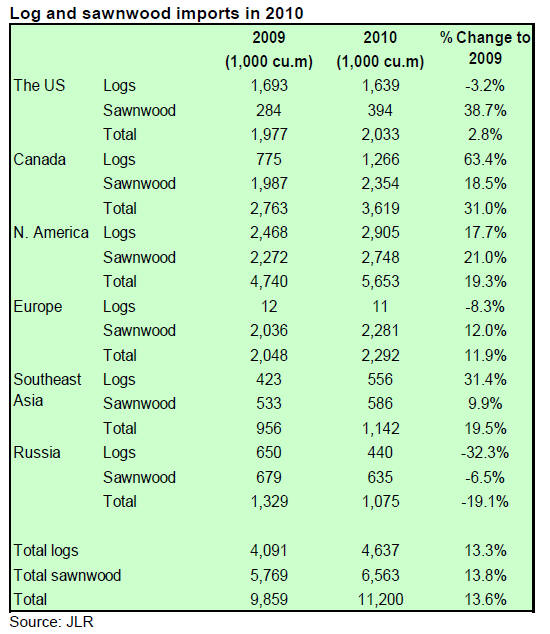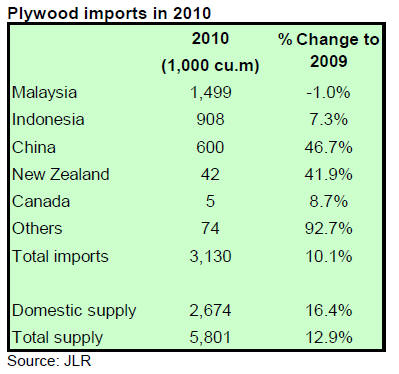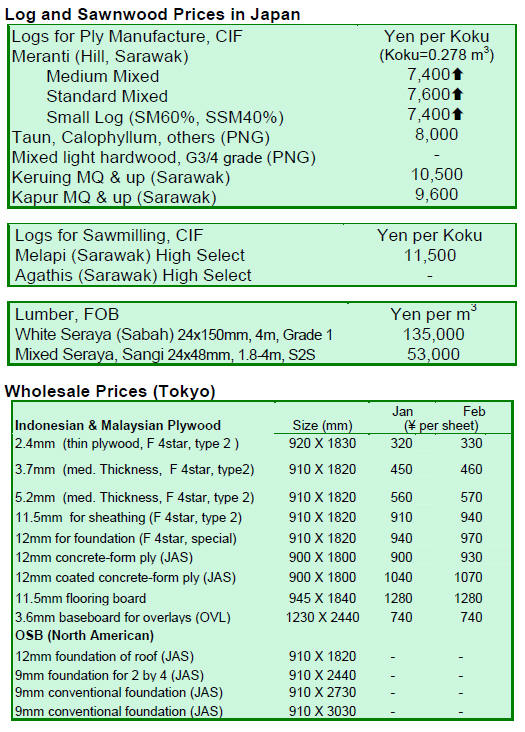Japan Wood Products
Prices
Dollar Exchange Rates of
2th Mar 2011
Japan Yen 81.89
Reports From Japan
Supply of tropical logs remains extremely tight
According to Japanese Lumber Reports (JLR), log supply
in Sabah and Sarak remains extremely tight due to heavy
rains hampering logging and transportation. Adverse
weather conditions are expected to persist through early
March. The celebration of Chinese Lunar New Year is
over and demand is back to normal. However, with tight
supply of logs, prices keep inching up. In Sarawak, export
prices for meranti regular logs breached US$300 per cu.m
FOB.
In Japan, monthly consumption of Southeast Asian logs
for both plywood and veneer production is around 40,000
cu.m. Some plywood mills have placed orders to build
their log inventories. However, orders could not be met by
importers due to unavailability of logs.
In Japan, CIF prices remained unchanged from the
previous month at Yen 7,400-7,500 per koku for Sarawak
meranti regular logs, Yen 6,600-6,700 per koku for small
meranti logs, and Yen 6,100-6,200 per koku for super
small meranti logs. Sabah kapur log prices also stood at
Yen 9,500 per koku, unchanged since November 2010.
Demand for keruin hardwood sawnwood by Japanese
crating manufacturers has strengthened, reports JLR.
Strong rebound of timber imports in 2010
The total volume of wood and timber product imports to
Japan was 14.894 million cu.m in 2010, up 13.2%
compared to 2009. Imports in 2010 showed the first
increase after four years of decline, reports JLR.
The share of imports of processed products including
sawnwood, plywood and laminated panels has been
increasing in relation to the share of log imports. In 2001,
the share of processed products was 52% and in 2010 it
has expanded to 69% of the total wood and timber product
imports.
Imports from North America, Europe, Southeast Asia and
New Zealand have increased while imports from Russia
have dropped due to the high export tax on logs, market
expectations for possible changes in future taxation and
problems encountered by Russian sawmills.
In 2010, depressed US housing starts and the strong Yen
against the US dollar underpinned timber exports from
North America to Japan. The US began to produce and
export more sawnwood to the Japanese market. The
decline in Japanese log imports from the US and Russia
was offset by log imports from Canada.
According to JLR, timber imports from Southeast Asia
rebounded in 2010 from the sharp drop experienced in
2009. Despite the apparent upswing, JLR reports that the
market does not consider this as reflecting an
improvement in demand.
European sawnwood exports to Japan have recovered
following two years of light trade. The total sawnwood
exports from Europe to Japan jumped 12% and imports of
laminated panels soared 24% over 2009.

Improved plywood supply in 2010
The supply of plywood in Japan in 2010 was 5.8 million
cu.m, up 12.9% from the level recorded in 2009. The
improved plywood supply in 2010 was a rebound from
four consecutive years of decline, reports JLR. In
particular, domestic supply and imports from China and
New Zealand have recovered significantly.
Of the total supply, plywood imports accounted for 54% in
2010, down 1.3 percentage points from 2009. Both
domestic and imported thick flooring, wall and roof panels
(24 and 28 mm) were among the products with upswing
in sales in the Japanese market.

Adhesive prices moving up
Prices of naphtha and methanol have increased and this is
impacting on the costs of producing adhesives for the
plywood industry. Due to the weak demand for plywood
and board products, adhesive manufacturers were not able
to raise prices earlier to cover their increased production
costs. Previously, manufacturers were only able to raise
the prices of phenol resin adhesive by 30% since June
2010. As the plywood market has picked up and prices
improved, adhesive manufacturers presently see an
opportunity to raise adhesive prices across the board.
Oshika Corporation which manufactures adhesive for the
plywood industry has announced its intention to raise
prices of melamine resin by 15%, and phenol resin and
urea resin by 10% with effect from 1 March 2011. In
addition, two major melamine resin manufacturers, Mitsui
Chemical and Nissan Chemical, have raised prices of
melamine resin by Yen 30-35 per kg since December 2010,
reports JLR.
Plywood manufacturers are against the Trans Pacific
Partnership (TPP)
As reported earlier, the Japanese government is currently
considering joining the Trans Pacific Partnership (TPP), a
free trade agreement between Singapore, New Zealand,
Australia, Chile, Peru, Malaysia, Vietnam, Brunei and the
USA.
The Japan Federation of Plywood Manufacturers has
added its voice to other national forest product
manufacturers in objecting to the TPP. At a meeting with
government officials, the chairman of Japan Federation of
Plywood Manufactures, Mr. A. Inoue, noted that
liberalisation of the timber trade would have serious
impacts not only on the domestic plywood industry but
also the whole forestry sector and employment in Japan.
Currently, some 60% of plywood consumed in Japan is
imported plywood mainly from Malaysia, Indonesia and
China. Mr. A. Inoue added that the current level of
plywood imports has already hampered the development
of the domestic plywood industry and the forestry sector.

Related News:
|